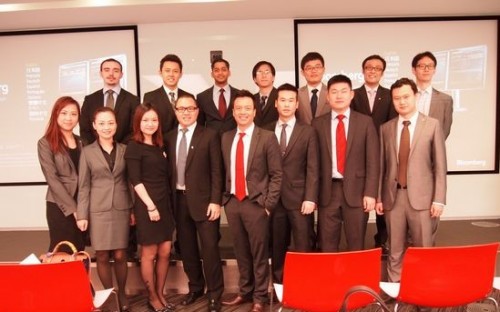One thing's for sure: any MBA who wants a job in banking needs to work hard on building connections in the industry.
We’ve had a look at the two most effective ways students are putting themselves out there in the banking job market: internships and treks. With both, there's a focus on long periods of building connections, and then working to sustain those relationships.
In banking, internships are regarded as an extended job interview: in some investment banks up to 70 per cent of hires are from the associate internship scheme.
Treks on the other hand have become a valuable tradition at business schools. Its a great opportunity for groups of MBAs to set out to a location, immerse themselves in an industry and make connections using alumni and b-school networks.
They're a great way to get recruiters interested in you and even have initial, informational interviews with them.
Margaux Berard successfully converted her internship with Deutsche Bank into an offer for a full-time role. Margaux is currently a Masters in Finance student at Grenoble Ecole de Management. Before she joined Grenoble, she wanted to work as a marketing advisor for a wine and spirit company but after an internship experience in banking she decided she would be more suited to a "figures-related" role!
She applied for the internship with Deutsche Bank through the firm's website and then completed one online quantitative test and two rounds of interviews.
As a summer intern, she did two rotations in two different teams within the Risk Office. The programme included training at the beginning of the summer, meetings with some of the company’s specialists, networking activities, and group project.
Margaux advises students who land a banking internship to show attention to detail, spending time networking and never being afraid of asking questions. Margaux said, “It's no longer possible for me to release a piece of work that I know I could improve: it must be the best it can possibly be! When it comes to networking, your co-workers have lot of experience and they are in general really keen on sharing it with you. Finally, never be afraid of asking questions... Be curious and open.”
Over at the Shanghai Advanced Institute of Finance (SAIF), where only the creme de la creme are admittedto their highly competitive Masters in Finance programme, its common for students to land internships at the likes of UBS, Credit Suisse, Morgan Stanley, JP Morgan and Deutsche Bank.
SAIF student Hui Zhang spent the summer of 2012 with Deutsche Bank. She got the position by applying through the bank’s online application process. It was a nine-week program that started in June and her time was divided between Hong Kong and Shanghai.
Hui was put to work on a very important project (Project Peony) that helped the bank decide what part of China to open its next branch in. To successfully complete the project, she had to get familiar with how the bank generated and disbursed its income, and how it allocated staff to make sure all projects were running smoothly.
Hui worked hard, ticked all the boxes and at the end of the internship was handed a ticket into banking!
A second SAIF student, Yuebo Wu, spent the summer with JP Morgan. He also applied through the bank’s online application portal and went through the typical gruelling interview and test stages.
During the internship, Yuebo worked in the investment banking department performing extensive financial analysis tasks. Going on the internship helped him be sure that he would like to work in banking. He learned that to succeed in banking you needed to be ready to learn new things quickly and have a great eye for detail.
MBAs who want to join the banking and finance industry often go on treks to financial centres such as New York, London and Hong Kong. Treks are not a substitute for internship. Clever MBAs use them to build connections with recruiters and top executives that can fast track them to interviews for jobs and internships.
MBAs at another Shanghai b-school, the China Europe International Business School (CEIBS) took their banking trek to Hong Kong. A total of 15 students from the 2012 MBA class and a member of the Career Development team travelled to there in December to meet leaders of international banks and multinational corporates.
The group networked with front office representatives from the investment banking, commercial banking, research, private wealth management, and sales and trading divisions.
At JP Morgan, CEIBS MBAs were welcomed by investment banking professionals from diverse backgrounds and were treated to a presentation and Q&A session, followed by networking with representatives from different business divisions.
At Bloomberg, a recruiting team gave the CEIBS students an overview of the firm's business in Asia and its plans for the future. They also got a behind-the-scenes look at how business news is broadcast live around the world.
At ANZ Bank, the group was welcomed by the Hong Kong CEO Susan Yuen and senior members of key business units, including Institutional Banking, Corporate Banking and Trade Financing.
The group was also very happy to see Denise Pu (CEIBS MBA 2010), who instrumental in connecting the CEIBS students with senior management.
CEIBS students also visited UBS, where they met Managing Directors from the Wealth Management division who provided informative presentations to them. They also met Yonghao Pu, the CIO of UBS Asia-Pacific who made a surprise appearance and talked about global macroeconomic trends.
The trip also included two networking events. At the first one, CEIBS MBAs were welcomed by CEIBS alumni as well as finance professionals in Hong Kong. The alumni, including Chris Wong (MBA 2010), Vivienne Guo (MBA 2010) and Gabriel Poon (MBA 2010) shared stories and provided valuable advice to the visiting group.
The second networking event came courtesy of Hong Kong University of Science and Technology, one of CEIBS' exchange schools. HKUST's Finance Club hosted a cocktail event in honour of the visiting CEIBS group!
Chicago Booth, a business school renowned for its formidable links with the banking and finance worlds, also runs very successful industry-focused treks, such as its Investment Bank Week.
This year students headed to New York where they attended formal events and cocktail receptions, and had informational interviews with bankers.
One Chicago Booth student, Matt Richman, highlighted the importance of networking ahead of the trip. Matt, who is a current ly in the first year of his MBA with a concentration in Finance and Accounting said that his experience during Bank Week was a culmination of all the networking he did earlier on in the programme.
Beginning in September, Chicago Booth Career Services and the student-run Investment Banking Group (IBG) organized about 50 events with many different investment banks. These events gave MBAs the opportunity to get acquainted with all of the firms looking to recruit Booth students, and to begin the networking process.
Matt spent his time on the trek having informational interviews with recruiters and executivess, as well as attending a variety of cocktail events.
Another Booth student who made the pilgrimage to America’s financial centre is Felipe Marin, another first-year MBA. Felipe said he could smell the job offers in the air as representatives from various banks courted him! “From CEOs to newly minted Associates, we were greeted with enthusiasm as we heard time and time again why we should choose to join their respective institutions”, he said.
His experience of Bank Week validated his reason for coming to Booth, which was that the school would provide him with his best chance of success getting into investment banking.
“Bank Week has only reiterated what I deduced beforehand: banks know that Chicago Booth produces excellent bankers and they are not shy to display their excitement towards us.” He enjoyed the energetic pace but won't be celebrating until he has a firm offer in hand. We're sure it won't be that far off!
Are you an MBA or a Masters in Finance student? Let us know what steps you’ve taken to get into the industry!
RECAPTHA :
0c
29
90
e1







